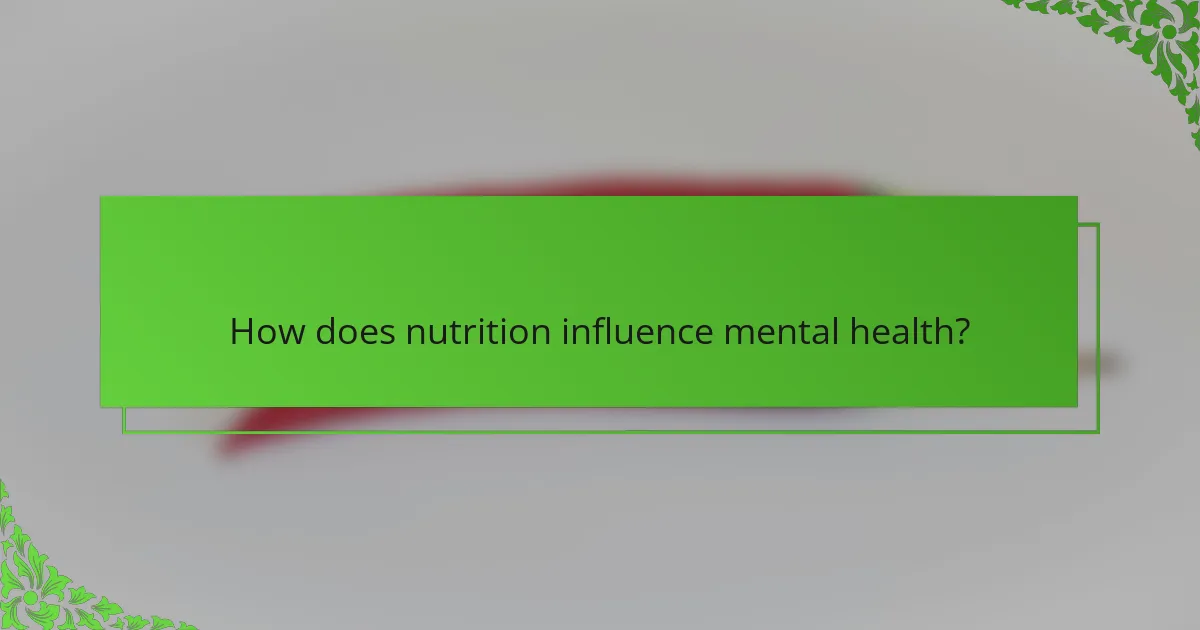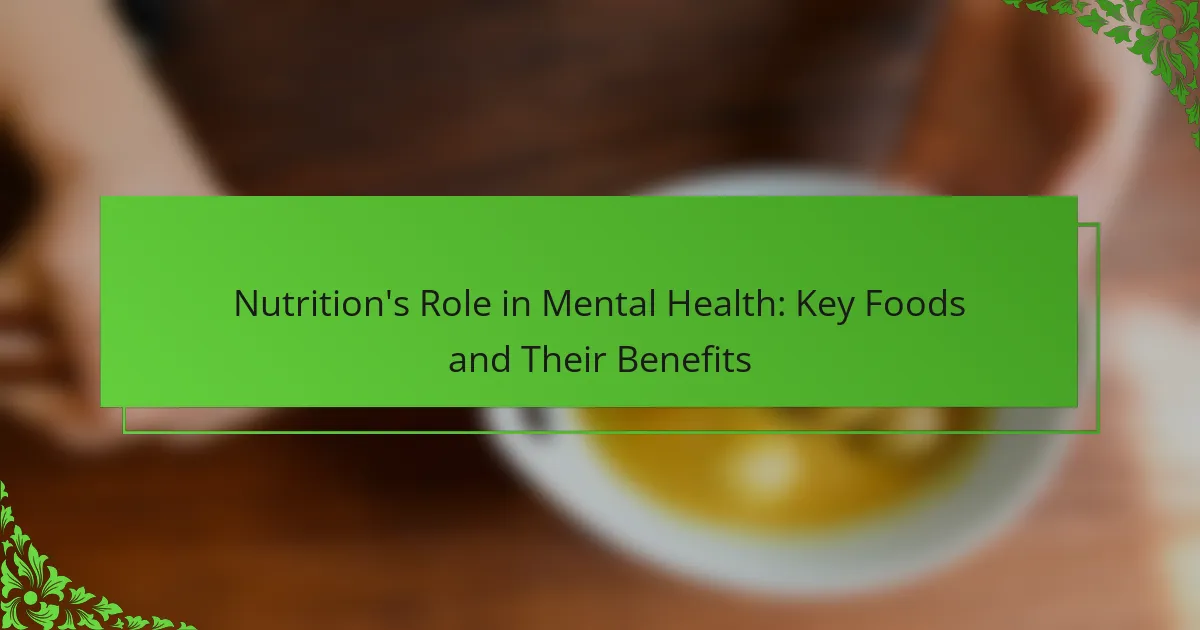Nutrition plays a crucial role in mental health by influencing mood and cognitive function. Key foods like fatty fish and leafy greens provide essential nutrients for brain health. Antioxidants from berries combat oxidative stress, while whole grains stabilize energy levels. Incorporating these nutrient-rich foods can enhance emotional resilience and overall mental well-being.

How does nutrition influence mental health?
Nutrition significantly influences mental health by providing essential nutrients that support brain function and emotional well-being. Key foods include fatty fish, which are rich in omega-3 fatty acids, known to reduce depression symptoms. Leafy greens provide folate, crucial for mood regulation. Whole grains, containing complex carbohydrates, help maintain stable blood sugar levels, positively affecting mood stability. Fermented foods, rich in probiotics, enhance gut health, linked to improved mental health outcomes. Regular consumption of these foods can lead to better mental health and emotional resilience.
What are the key nutrients that support brain function?
Key nutrients that support brain function include omega-3 fatty acids, antioxidants, B vitamins, vitamin E, and magnesium. Omega-3 fatty acids enhance cognitive performance and mood, while antioxidants protect against oxidative stress. B vitamins, particularly B6, B12, and folate, are crucial for neurotransmitter synthesis. Vitamin E supports brain health by reducing cognitive decline, and magnesium plays a role in nerve transmission and neuroprotection.
Why is a balanced diet essential for emotional well-being?
A balanced diet is essential for emotional well-being as it directly influences brain function and mood regulation. Nutrients such as omega-3 fatty acids, vitamins, and minerals support neurotransmitter production, impacting mental health. For example, omega-3s found in fish can reduce symptoms of depression. Additionally, whole grains stabilize blood sugar levels, which can enhance mood stability. A deficiency in key nutrients may lead to increased anxiety and stress. Prioritizing a variety of nutrient-dense foods fosters a healthier mind and improves emotional resilience.

Which foods are known for their mental health benefits?
Nutrition significantly impacts mental health. Foods known for their mental health benefits include fatty fish, nuts, berries, leafy greens, and whole grains.
Fatty fish, such as salmon and mackerel, are rich in omega-3 fatty acids, which enhance brain function. Nuts, particularly walnuts, provide healthy fats and antioxidants that support cognitive health. Berries, like blueberries, are high in antioxidants and may improve memory. Leafy greens, including spinach and kale, are packed with vitamins that contribute to mental clarity. Whole grains, such as oats and quinoa, provide steady energy and support mood regulation.
Incorporating these foods into your diet can lead to improved mental well-being and cognitive performance.
How do omega-3 fatty acids impact mood?
Omega-3 fatty acids positively impact mood by reducing symptoms of depression and anxiety. They promote the production of neurotransmitters like serotonin, enhancing emotional well-being. Studies show that individuals with higher omega-3 intake experience improved mood stability and cognitive function. The unique attribute of omega-3s is their ability to influence brain cell membrane fluidity, which is crucial for optimal neurotransmission.
What role do antioxidants play in cognitive function?
Antioxidants enhance cognitive function by reducing oxidative stress and inflammation in the brain. They protect neurons from damage caused by free radicals, which can improve memory and overall mental performance. Foods rich in antioxidants, such as berries, dark chocolate, and green leafy vegetables, contribute significantly to brain health. Studies indicate that a diet high in antioxidants correlates with a lower risk of cognitive decline and neurodegenerative diseases.
Which vitamins are crucial for mental clarity and focus?
Vitamin B12, omega-3 fatty acids, and vitamin D are crucial for mental clarity and focus. These nutrients support brain function and cognitive health.
Vitamin B12 enhances memory and concentration, while omega-3 fatty acids improve mood and mental performance. Vitamin D, often linked to mood regulation, can also impact cognitive functions.
Incorporating foods rich in these vitamins, such as fatty fish, eggs, and fortified dairy products, can lead to better mental clarity. Regular intake is essential for optimal brain health.

How can diet affect stress and anxiety levels?
Diet significantly influences stress and anxiety levels through nutrient-rich foods. Consuming omega-3 fatty acids, found in fish, can reduce anxiety symptoms. Foods high in antioxidants, like berries, combat oxidative stress, promoting mental well-being. Magnesium-rich foods, such as leafy greens, help regulate cortisol levels, lowering stress. Additionally, probiotics from yogurt support gut health, which is linked to mood regulation. Integrating these foods into your diet can enhance mental health by stabilizing mood and reducing anxiety.
What are the best foods to reduce stress?
Foods rich in omega-3 fatty acids, antioxidants, and vitamins can significantly reduce stress. Key options include fatty fish, dark chocolate, nuts, berries, and leafy greens.
Fatty fish, such as salmon and mackerel, are high in omega-3s, which lower anxiety levels. Dark chocolate contains flavonoids that improve mood and cognitive function. Nuts provide healthy fats and magnesium, supporting stress management. Berries offer antioxidants that combat oxidative stress, while leafy greens are packed with vitamins that promote overall mental well-being.
Incorporating these foods into your diet can enhance mental health and resilience against stress.
How does sugar consumption relate to anxiety?
Sugar consumption can contribute to anxiety by causing fluctuations in blood sugar levels. High sugar intake leads to rapid spikes and drops in glucose, which can trigger mood swings and increased anxiety. Research indicates that diets high in sugar are associated with a greater risk of anxiety disorders. Additionally, excessive sugar can lead to inflammation, which may negatively affect mental health. Reducing sugar intake may help stabilize mood and improve overall mental well-being.

What is the connection between gut health and mental well-being?
Gut health significantly influences mental well-being due to the gut-brain axis. This connection highlights how a balanced diet, rich in probiotics and prebiotics, can enhance mood and cognitive functions. Foods like yogurt, kefir, and fiber-rich fruits support gut flora, improving mental health outcomes. Studies show that individuals with healthier gut microbiomes report lower levels of anxiety and depression.
How do probiotics influence mood and behavior?
Probiotics can positively influence mood and behavior by enhancing gut health and promoting the production of neurotransmitters. Research indicates that a balanced gut microbiome can lead to reduced symptoms of anxiety and depression. Probiotics, such as Lactobacillus and Bifidobacterium strains, have been shown to improve emotional well-being by modulating the gut-brain axis. This connection highlights the importance of nutrition, specifically probiotics, in supporting mental health.
What foods promote a healthy gut microbiome?
Foods that promote a healthy gut microbiome include fermented foods, high-fiber fruits, vegetables, and whole grains. Fermented foods like yogurt and sauerkraut contain probiotics, which enhance gut flora. High-fiber foods such as beans and lentils support beneficial bacteria growth. Additionally, fruits like bananas and apples provide prebiotics that nourish these bacteria. Whole grains contribute to overall gut health by improving digestion and reducing inflammation.

Which dietary patterns are linked to improved mental health outcomes?
Dietary patterns such as the Mediterranean diet and plant-based diets are linked to improved mental health outcomes. These patterns emphasize whole foods, healthy fats, and nutrient-rich ingredients.
The Mediterranean diet, rich in fruits, vegetables, whole grains, and omega-3 fatty acids, has shown benefits in reducing depression and anxiety. Studies indicate that individuals adhering to this diet experience lower levels of psychological distress.
Similarly, plant-based diets, which focus on plant foods and limit animal products, may enhance mood and cognitive function. Research suggests that high intake of fruits and vegetables correlates with better mental well-being.
Incorporating these dietary patterns can lead to significant improvements in mental health, highlighting the importance of nutrition in psychological wellness.
How does the Mediterranean diet support mental wellness?
The Mediterranean diet supports mental wellness through nutrient-rich foods that enhance brain health. This diet emphasizes fruits, vegetables, whole grains, nuts, and healthy fats, which are linked to reduced depression and anxiety.
Key components include omega-3 fatty acids from fish, antioxidants from berries, and fiber from whole grains. Studies show adherence to this diet correlates with improved mood and cognitive function. The unique attribute of the Mediterranean diet is its focus on plant-based foods, which provide essential vitamins and minerals for mental health.
Incorporating these foods can lead to lasting benefits, making the Mediterranean diet a valuable approach to supporting mental wellness.
What is the impact of plant-based diets on mood?
Plant-based diets positively impact mood by providing essential nutrients that support mental health. These diets are rich in antioxidants, vitamins, and minerals, which can enhance brain function and reduce symptoms of anxiety and depression.
Research indicates that plant-based foods, such as fruits, vegetables, nuts, and whole grains, promote the production of neurotransmitters like serotonin. For example, diets high in omega-3 fatty acids found in flaxseeds and walnuts can improve mood regulation.
Additionally, the fiber in plant-based diets supports gut health, which is increasingly linked to mental well-being. A healthy gut microbiome can influence mood and cognitive functions, contributing to overall emotional stability.
In summary, adopting a plant-based diet can lead to improved mood and mental health through nutrient-rich foods that support brain function and gut health.

What are the unique attributes of foods that enhance mental health?
Foods that enhance mental health possess unique attributes such as high omega-3 fatty acid content, rich antioxidant levels, and specific vitamins like B12 and D. These attributes contribute to improved mood, cognitive function, and reduced anxiety. For instance, fatty fish like salmon provide substantial omega-3s, while berries offer antioxidants that combat oxidative stress. Additionally, leafy greens contain folate, which is linked to better mental health outcomes.
How do fermented foods contribute to emotional stability?
Fermented foods significantly enhance emotional stability by promoting gut health, which is closely linked to mental well-being. These foods, such as yogurt and kimchi, contain probiotics that support the microbiome. A balanced microbiome can influence neurotransmitter production, including serotonin, which regulates mood. Studies show that individuals consuming fermented foods report lower levels of anxiety and depression. The unique attribute of fermented foods is their ability to improve gut-brain communication, fostering emotional resilience.
What is the significance of seasonal foods in mental health?
Seasonal foods significantly impact mental health by providing essential nutrients at optimal times. These foods, often fresher and more flavorful, can enhance mood and cognitive function. For instance, fruits and vegetables in season are rich in vitamins and antioxidants, which support brain health. Consuming seasonal produce fosters a connection to nature, promoting mindfulness and reducing stress. Moreover, the diversity of seasonal foods encourages a varied diet, crucial for overall mental well-being.

What are some common misconceptions about nutrition and mental health?
Many people mistakenly believe that nutrition has little impact on mental health. In reality, certain foods significantly influence mood and cognitive function. For instance, omega-3 fatty acids found in fish improve brain health and reduce depression symptoms. Additionally, a diet rich in fruits, vegetables, and whole grains supports overall mental well-being. Conversely, high sugar and processed food consumption can exacerbate anxiety and depression. Understanding these connections helps debunk myths about nutrition’s role in mental health.
Why do people overlook the role of nutrition in mental health?
People often overlook nutrition’s role in mental health due to a lack of awareness and understanding. Many associate mental health solely with psychological factors, neglecting how diet influences brain function and mood. Nutrient deficiencies can lead to symptoms of anxiety and depression, yet the connection remains underappreciated. For instance, omega-3 fatty acids are vital for brain health, but many diets lack sufficient amounts. As a result, individuals miss out on the mental health benefits that a balanced diet can provide.
What are the myths surrounding sugar and mental health?
Many myths exist about sugar’s negative impact on mental health, but evidence suggests moderation is key. Excessive sugar intake may lead to mood swings and energy crashes, while moderate consumption does not inherently harm mental well-being. Research indicates that processed sugars can affect brain function, potentially leading to anxiety and depression. However, natural sugars found in fruits can be beneficial due to their fiber content and vitamins. Understanding the distinction between these types is crucial for mental health.
How can misinformation about diets affect mental wellness?
Misinformation about diets can significantly harm mental wellness. It may lead individuals to adopt unhealthy eating habits, resulting in nutrient deficiencies that affect mood and cognitive function. For instance, diets lacking essential fatty acids can increase the risk of depression. Additionally, conflicting diet information can create anxiety and confusion, undermining confidence in food choices. Accurate nutrition education is vital for promoting mental health and well-being.

What practical strategies can improve nutritional intake for mental health?
Incorporating practical strategies can significantly enhance nutritional intake for mental health. Focus on whole foods, including fruits, vegetables, lean proteins, and whole grains, as they provide essential nutrients that support brain function.
1. Prioritize omega-3 fatty acids found in fish, walnuts, and flaxseeds, which are linked to improved mood and cognitive function.
2. Include antioxidants from berries and leafy greens to combat oxidative stress and inflammation, promoting overall mental well-being.
3. Maintain hydration by drinking adequate water, as dehydration can negatively impact mood and cognitive performance.
4. Limit processed foods and added sugars, which may contribute to mood swings and mental fatigue.
These strategies emphasize the importance of a balanced diet in supporting mental health through specific nutrient-rich foods.
How can meal planning enhance mental well-being?
Meal planning can significantly enhance mental well-being by promoting healthier food choices and routines. Consistent nutrition impacts brain function and mood regulation.
Incorporating foods rich in omega-3 fatty acids, such as salmon and walnuts, can improve cognitive function. Leafy greens and whole grains provide essential vitamins and minerals that support mental health.
Meal planning encourages mindfulness, allowing individuals to focus on their dietary choices and overall health. This practice can reduce stress and anxiety associated with last-minute food decisions.
Studies show that a balanced diet can lead to a 25% reduction in the risk of depression. By prioritizing nutrition, individuals can foster a positive mental state and enhance overall well-being.
What are the best practices for incorporating mood-boosting foods into daily meals?
Incorporating mood-boosting foods into daily meals enhances mental well-being. Focus on foods rich in omega-3 fatty acids, antioxidants, and vitamins.
1. Start your day with oatmeal topped with berries and nuts for sustained energy and mood support.
2. Include fatty fish like salmon or sardines in lunch for omega-3 benefits linked to improved mood.
3. Snack on dark chocolate or nuts, which contain compounds that may increase serotonin levels.
4. Prepare dinner with leafy greens and legumes, providing essential nutrients that support brain health.
These practices promote a balanced diet that positively influences mental health.
Which common mistakes should be avoided when focusing on nutrition for mental health?
To optimize nutrition for mental health, avoid common mistakes like neglecting whole foods, overlooking hydration, and ignoring individual dietary needs. Focusing solely on supplements can also be detrimental. Balanced meals with diverse nutrients support brain function effectively.



